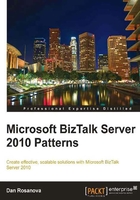
Understanding what is BizTalk Server
BizTalk Server is quite possibly the most advanced product produced by Microsoft to date. It offers scalability and reliability simply unrivalled on the Windows platform or, for that matter, any platform. According to Gartner, it falls in the leaders quadrant and has the highest ability to execute. It is now in its seventh version (2010) and has grown more robust and feature-rich with each release. It scales both up and out and is designed to meet the needs of even the most demanding enterprises, but also to work well for medium sized organizations.
At its core, BizTalk Server is meant to be a mediator or a conduit for information throughout an organization. BizTalk's primary focus is connecting systems and providing services. Yet it is more than just a middleware product, it is an entire toolset designed to help you build, run, and grow your enterprise's information systems. Today, more than ever, no software lives in isolation and BizTalk is the tool with which to break down the isolation that is still inherent in most existing software. Even cloud offerings like Azure or Salesforce.com no longer exist in a vacuum. Often these clouds are required to interact with other software systems in the enterprise, or with business partners, and increasingly with other cloud platforms. BizTalk is designed to bridge the gap between applications; to act as a mediator, broker, and router for business transactions. BizTalk is an integral part of Microsoft's future strategy, including their Cloud Strategy.
In addition to the core messaging server, additional tools such as Tracking, Monitoring, Business Rules, and a Visual Studio based IDE experience are provided to make working with BizTalk more familiar and powerful. Any developer having a background with Microsoft development should feel quickly at home with BizTalk. Developers from other platforms should also find the experience familiar when done correctly.
Through the use of BizTalk's core components (Adapters, Pipelines, Mapping, Orchestration, and Business Rules) BizTalk allows seamless integration with all major enterprise platforms such as SQL Server, DB2, Oracle, SAP, PeopleSoft, and many others. Beyond integration, BizTalk allows expressive and powerful business processes to be built upon the integrations it facilitates. Used in conjunction with human workflow products like SharePoint and InfoPath, BizTalk provides the enterprise with a variety of tools with which to create expressive, unique solutions that enable business and increase productivity.
In the past, BizTalk was referred to as a Business Process Management (BPM) product but that doesn't go far enough to convey the power of BizTalk. It is really more of a business enablement platform. As we will learn in the second part of this book, BizTalk can be a central component in the connected enterprise via enterprise application integration, SOA, or ESB.